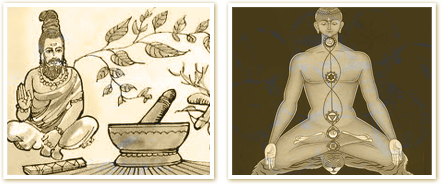
Overview
Manas roga in modern age are known as psychiatric diseases and treatment with Ayurvedic principles is known as Ayurvedic psychotherapy or Ancient psychiatry. The study of mental health constitutes one of the eight divisions of Ayurveda.
Underlying pathology of Manas roga is psychological or emotional imbalance. Physical diseases are outcome of psychological factors. It is a common observation that patients are careless about mental and physical health as they are preoccupied by psychological or emotional imbalance.
According to Manovigyana, site of mind is heart. Heart represents network of channels within the human body which are responsible for flow of fluids. Disturbance in physical or mental form, results in physical and mental diseases.
Manas roga or mental diseases are associated with emotion trauma, negative attitude, stress, sexual-abuse, personal losses or drug-induced. According to Ayurvedic philosophy, Manas roga are born out of disturbance in Sattva, one of the Trigunas. Sattva is largely responsible for inherent quality of the mind. Sattva, if overshadowed by Rajas or Tamas, losses its predominance and manifestations are evident from depression, anxiety-neurosis, stress, sham-rage, schizophrenia and above all, melancholia.
In era of rat-race and cut-throat competition, we and society are under the influence of Rajas. Excessive travelling, over consumption of stimulates like tea and coffee, and preoccupied mind have depressing effect on smooth functioning of the brain. Ayurveda describes astral body or emotional body derived from life-force, emotions and thoughts. Astral body is nothing but an underlying energy form, from which the physical is produced.
Ayurveda describes channels of circulation both at physical and mental level. If the smooth functioning of channels of circulation is disturbed at physical level, the result is physical disease. Similarly, if the channels of circulation related to astral body are disturbed, Manas roga are born. Basically there is stagnation of mental energy or it may become directionless, resulting in origin of various psychiatric diseases.
As far modality of treatment of Manas roga is concerned, Ayurveda recognise three categories:
- Daivavyapashraya chikitsa (Divine therapy) includes chanting of mantras and performances of homas are integral part of Daivavyapashraya chikitsa. Daivavyapashraya chikitsa largely revives normal functioning of Sattva and removes obstacles of Rajas.
- Satwavajaya chikitsa (Trance therapy or psychotherapy) is aimed at regaining the normal mental activity by conducting practice of yama, niyama, asana and pranyama. These remedies ensure free circulation of prana vayu (oxygen) throughout the body resulting in removal of blockage of channels of circulation linked to mind. Recent research has showed Satwavajaya chikitsa superior to Shunthi tablet in the treatment of Manasa-Dosha Ajeerna (atonic dyspepsia).
- Yuktivyapashraya chikitsa (Rational Treatment) is aimed at rational use of drugs and nutrition. It is broadly classified into two groups namely shodhana and shamana.
Bipolar disorder is common in psychiatric practice. Rao in article published in Indian Journal of Psychiatry links manic depression and other psychiatric problems with Vata imbalance. Vata largely represents the energy associated with the activities of the nervous system. If functioning of Vata is disturbed, consequence is anxiety, racing thoughts, appetite disturbances, depression, insomnia and excessive worry- symptoms consistent with bipolar disorder.
As regard, Manas chikitsa is concerned, Ayurveda recommends preventive medicine. Correct behaviour, balanced–diet, and non-suppression of natural urges, following daily and seasonal health regimens are integral part of the Manas chikitsa. Ayurveda advocates use of nervine-tonics like Brahami, Ashwagandha, Guduchi, Yastimadhu and Vacha for preventing onset of Manas roga. Jatamansi and Tagara are drugs of choice in the treatment of anxiety neurosis. Ashwagandha and Shilajit have good antidepressant potential as confirmed by clinical studies.
Clinical research this century has unearthed the potential of Ayurvedic formulations in the treatment of Manas roga. Ashwagandharistha, Unmadagaja kesari rasa, Shiva Gudika, Vachadi churna and Panchagavya Ghrita are famous formulations used in the treatment of Manas roga.
